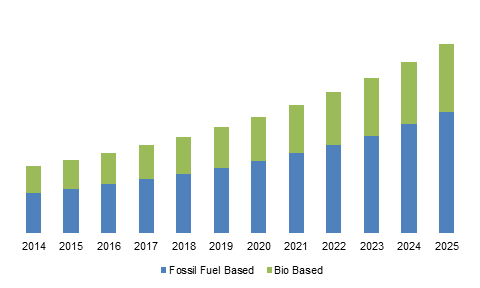Dimethyl ether market remuneration to exceed US$14.4 bn by 2025, transportation fuel to emerge as a promising application segment
Publisher : Fractovia | Latest Update: 2019-02-19 | Published Date : 2017-02-09Request Sample
Global dimethyl ether market has proliferated considerably over the past decade with increasing efforts to harness the potential of biomass and natural gas for numerous applications. Whether being used as an aerosol propellent or as a reagent in the production of other chemicals, dimethyl ether has been widely accepted owing to easy availability of the above raw materials and even other solid raw materials like coal. Accelerating development of vast natural gas reserves by major oil and gas corporations to support the production of gas-based industries will further boost the dimethyl ether industry. The compound has lately been subject to extensive research to propel its use in the automotive segment as a cleaner alternative to diesel or liquified petroleum gas (LPG), even for blending in fuel mixture due to remarkable combustion properties.
U.S. bio-based and synthetic dimethyl ether (DME) market size, by raw material, 2014 - 2025 (USD Million)

With the rapid increase in the production and use of commercial vehicles, the transportation fuel application has turned out to be one of the most promising growth avenues for the dimethyl ether market. Although diesel engines and dimethyl ether are said to have similar power and efficiency ratings, utilizing DME as an alternative to diesel fuel can notably eliminate the emission of particulates and possibly remove the need for costly particulate filters. On the other hand, due to much lower energy density than diesel, dimethyl ether may require a fuel tank that is almost double in size but considering the savings in cost and emissions it can achieve automakers can be expected to try and find solutions to better implement a DME-powered engine. In 2017, almost 23.85 million commercial vehicles were produced worldwide, indicating tremendous growth prospects for the dimethyl ether industry.
Initiatives to deploy DME in the automobile sector have been largely observed in the U.S., Europe as well as Asia-Pacific region. In 2015, the U.S. Department of Energy had announced an $11 million fund for supporting the development of alternative fuels for medium and heavy duty vehicles which also focused on dimethyl ether. The dimethyl ether market has been witnessing a rise in consumption with several such government efforts to help curb pollution and enable a greener transport sector. The German government was credited with co-funding a three-year research with Ford to test cars fitted with engines compatible with natural gas and biomass-based DME. The U.S. represents a great opportunity for the dimethyl ether market in terms of fuel application, since in 2017 the country had produced the largest number of commercial vehicles in the world.
Speaking further, there is a growing demand for diesel-powered vehicles in the region, a small example being the contract obtained by Nova Bus in October 2018 for delivering 350 new diesel buses for Baltimore’s public transport system. Public transport is a key element of any major city and metro, demonstrating the potential target market which can expand the North dimethyl ether industry in the future. With respect to other parts of the world, DME has also garnered interest in countries like China, Japan and Australia for its impending adoption as a diesel alternative. Established in 2015, Australian dimethyl ether fuels is a company aimed at boosting the production of cleaner-burning fuels onshore and help improve air-quality.
Elaborating further on the purpose of the company based out of Brisbane, it plans to build the country’s very first full-scale DME production facility by 2020 for delivering a fuel that replaces diesel in power stations, machinery and heavy vehicles. It also wants to explore blending the compound with LPG for use in passenger vehicles, signifying a lucrative area of development for the dimethyl ether industry. Implying the benefits of producing synthetic dimethyl ether on a large scale, around 23.5 billion liters of diesel was used in Australia during 2014-15, making the country one of the largest per capita diesel consumers.
The dimethyl ether market offers significant ability to mitigate the world’s diesel emission concerns and assist automakers in sustaining a profitable future amid increasing criticism from climate advocates and environmentalists. With other applications like use in aerosol products and LPG blends providing a consistent source of revenue, the dimethyl ether market is anticipated to surpass $14.4 billion in global valuation by 2025.